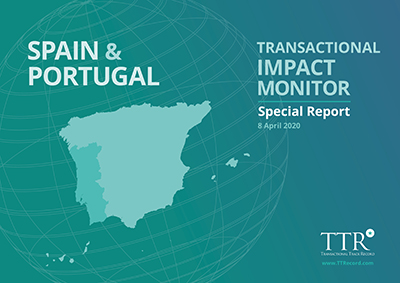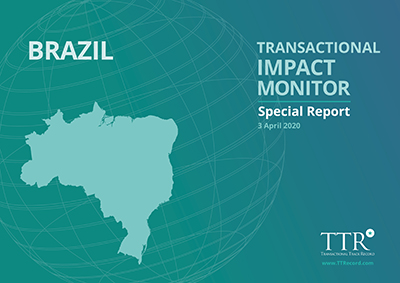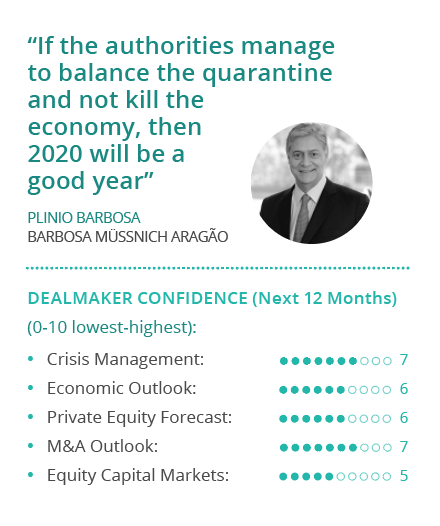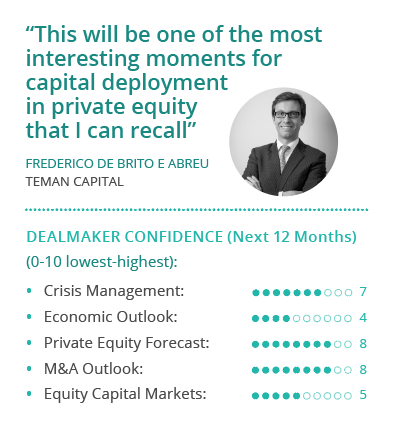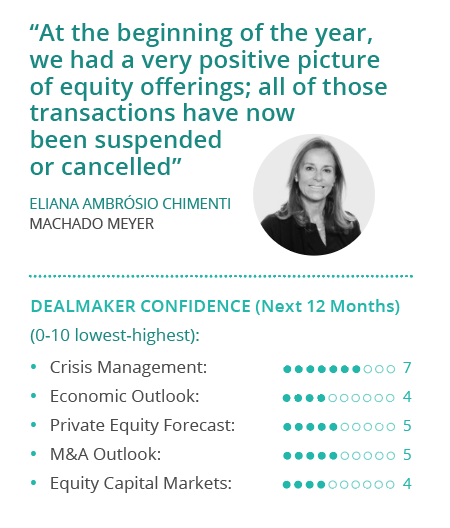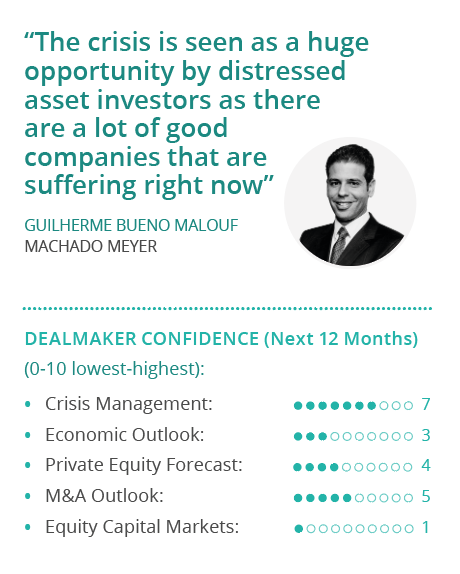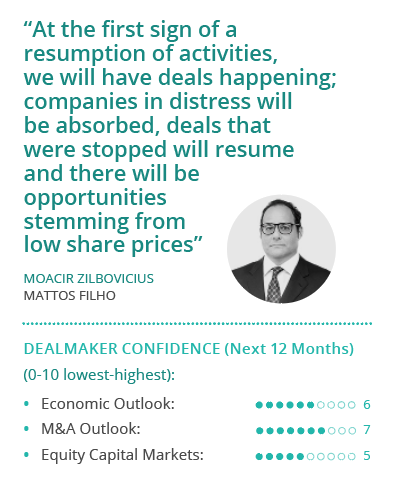Transactional Impact Monitor: Spain & Portugal – Vol. 1
8 April 2020
TTR’s Transactional Impact Monitor (TIM) is a Special Report combining local knowledge and market visibility from top dealmakers developed to address extraordinary situations affecting the macroeconomic stability and M&A outlook in core markets
INDEX
SPAIN
– M&A Outlook
– Private Equity
– Equity Capital Markets
– Handling the Crisis
PORTUGAL
– M&A Outlook
– Private Equity
– Handling the Crisis
– The View from Milan
– Dealmaker Profiles
SPAIN

As alarm and panic make way for cautious optimism in Spain’s battle with SARS-CoV-2 amid a fall in the daily tally of deaths attributed to the virus, the country’s top dealmakers tell TTR of the unprecedented impact containment measures are having on the economy and the transactional market.
The year kicked off strong, private equity firms had a lot of dry powder, but there was a feeling that we were nearing the end of the cycle, said Latham & Watkins Managing Partner Ignacio Gómez-Sancha. “The situation has now changed dramatically from a growth market to a panorama of shock.”
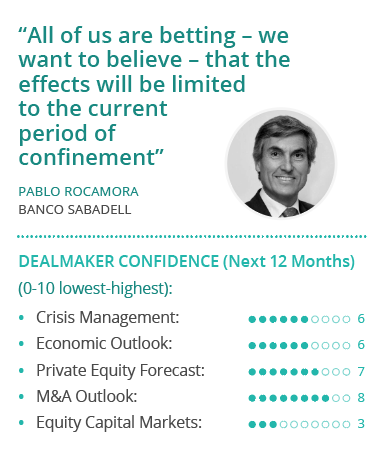
After nearly a month of confinement, which tightened on 14 March with a royal decree that has since been extended through 25 April, countless companies in Spain are reeling, factories are shuttered, restaurants closed, and the bar culture the country is famous for, conspicuously absent.
Spaniards are demonstrating resolve, absolutely convinced of the prudence of adhering to the royal decree for the common good, despite a generalized lack of trust in government predating the crisis, and morale is improving as the number of reported cases reaching the country’s hospitals stabilizes. Just like the enhanced security screening at airports in place since 2001, measures imposed to safeguard public health have been accepted as the new normal, said Gómez-Sancha.
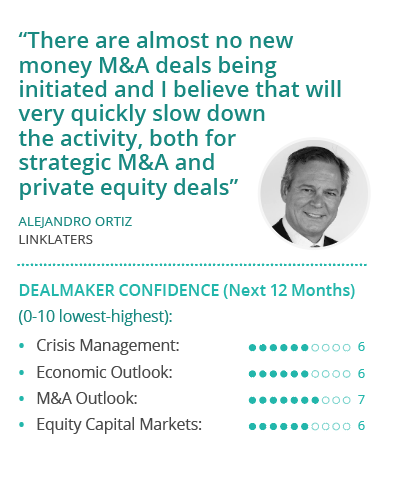
The Spanish government has approved some EUR 100bn to support corporates impacted by the shutdown, making EUR 20bn available to date, 50% allocated to loan guarantees and for small and medium-size enterprises. “What is still lacking are concrete measures to implement it,” said Gómez-Sancha.
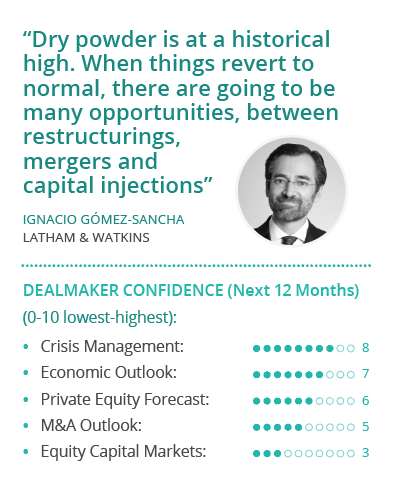
The funds allocated for businesses impacted by the shutdown form part of a broader pledged package of support worth more than EUR 200bn, or nearly 20% of Spain’s GDP. Measures include a moratorium on evictions and utility interruptions affecting those whose livelihoods have been interrupted, with corresponding subsidies to service providers. The government has also announced concessional micro financing for consumers and the postponement of social security contributions for the self-employed.
M&A Outlook
… Click here to access the first issue of Transactional Impact Monitor: Spain & Portugal
PORTUGAL
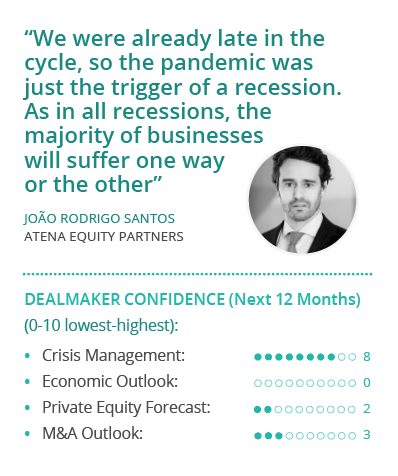
The Portuguese government issued a stay at home plea to its citizens on 13 March, the same weekend the royal decree was issued in Spain. A week later, the government declared a state of emergency and ordered all non-essential businesses closed, a measure renewed 3 April for another fortnight. The monetary response to the crisis has been modest by comparison, however, with just EUR 3bn allocated in guarantee schemes for SMEs and midcaps and another EUR 7bn being sought from the European Commission.
SMEs in Portugal will essentially depend on state aid, which at the moment has not matched expectations, according to Vieira de Almeida (VdA) Group Senior Partner and Head of M&A Practice Jorge Bleck. All companies related to tourism in Portugal are having a very rough time, Bleck noted. “It is devastating because it has meant losing almost all revenue in 24 hours. Those activities were effectively providing jobs to many, many people in Portugal.”
“For the most optimistic in the tourism and commercial aviation sectors, 2020 is a lost year,” said PLMJ Partner and co-head of Corporate M&A Duarte Schmidt. “Those who are most pessimistic are worried this might be the start of a very long recession.”

The timing of this crisis is unfortunate for Portugal, as it hits at a moment of fiscal vulnerability, Bleck said. “People are forgetful, because they were deluded with the increase in GDP and its mathematical effect of reducing the debt-to-GDP ratio,” Bleck said. The overall debt increased, however, he pointed out. “Now that GDP will fall, we will end up with debt levels in the region of 140%,” he said.
The impacts of the SARS-CoV-2 response in Portugal are very different for industrial versus service companies, noted Atena Equity Partners Chairman João Rodrigo Santos. Most service providers are closed for business, whereas industrial companies, especially those that are export-oriented, are still open but probably experiencing a slowdown in new orders, he said.

“Most companies are preparing for a very complicated period ahead by reducing costs and securing rescue financing from banks,” Santos said. “We were already late in the cycle, so the pandemic was just the trigger of a recession. As in all recessions, the majority of businesses will suffer one way or the other,” said Santos.
Santos is not optimistic about the prospects for a rapid recovery. The consumer discretionary segment is going to suffer more over the next couple of years, both at services and industrial levels, he said.
“Besides being traditionally a very cyclical sector, I believe this time the ramp-up is going to be slower given the likely unprecedented drop in GDP, rising unemployment, and the anti-social trauma this pandemic will create,” he warned.
M&A Outlook
… Click here to access the first issue of Transactional Impact Monitor: Spain & Portugal
